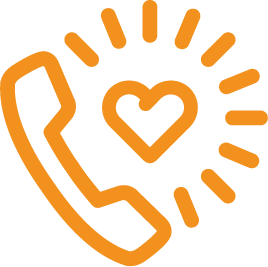Finding a living donor
How to find a living donor
Finding a living donor can be hard. Some patients say it’s harder than the transplant itself.
Start with these steps:
1) Learn about living donation

Learn about living donation and share that information. You can learn more about living donation by:
- Reading the information on this website and sharing it with your family
- Talking to your doctor or other member of your healthcare team
- Visiting the living donation section of the UNOS website
2) Make a list of people to tell

Many people don’t know about living donation, and some may not even know you need a kidney. Include as many people as you can:
- Family and friends
- People from church or school
- Social and work groups
3) Think about the story

Think about the story of your kidney disease and need for a transplant. Decide what you would want a donor to know, and how you would tell them your story. For some people, writing the story might help. Your social worker can also help you learn how to talk about your kidney story.
4) Meet with your close family and friends

Meet with your close family and friends and people you trust to share your story. Choose a place that is easy to meet where you can feel comfortable, such as:
- Your home
- A church
- A community center
- A private room in a restaurant
5) Get the word out

- Allow other people to talk about your need for a living donor: Your family members, close friends, and other people you trust could do this well once they understand kidney disease and your treatment options.
- Find a kidney coach: It isn’t easy asking someone to consider donating a kidney. A kidney coach is someone who cares about you and wants to help you find a living donor. Often, a kidney coach is a spouse, family member, or close friend of the person who needs a kidney transplant. When someone volunteers to be your kidney coach, their job is to spread the word about your need for a living donor kidney transplant. They can get the word out using the strategies listed here. The kidney coach also helps possible living donors connect with the transplant center to learn more.
- Send a letter or email about your need for a living donor to important people in your life: Sending a letter or email lets you speak personally and privately to people who care about you. It also lets people think about your situation and about their role without needing to respond right away.
- Share your need for a living donor with your community in ways that make sense for you, such as:
- Ask your employer to include your story in the company newsletter or website
- Give a presentation about organ donation and transplantation at work or church, or ask someone else to give one for you
- Put a notice in the bulletins of your religious center, professional groups, and social clubs
- Contact your local news to see if they’ll run a story about you
- Post your interest in living donation on social media or websites: Many patients use social media to share their story, which may help your story reach a larger group of people. Be careful with social media. Some people have tried to take advantage of a patient’s vulnerability by offering to donate a kidney for money. This is illegal. Ask your transplant center for their policy about living donors you find on social media.
- Get support from the National Kidney Foundation’s “The Big Ask, The Big Give” program:
- Visit the National Kidney Foundation’s website
- Talk to a trained professional at the NKF Cares help line: 844.224.4275
- Email a trained professional at the NKF Cares help line: [email protected]
- Talk to a living donor or recipient: 855-653-7337
- Get support from the Living Kidney Donors Network
Tips for sharing information on social media and websites

Websites
- Living Kidney Donors Network is a website that can help you develop a campaign to get the word out that you need a kidney transplant.
- UNOS training – Want to amplify your story on social media? We’ll show you how in “Using Social Media for Organ Donation Advocacy.”
Social media
- Most donors know the patient ahead of time, so tell friends and family first before reaching out to strangers
- Be honest
- Control your Facebook privacy settings so that you only inform those who are “friends” with you
- Don’t put names or phone numbers of the transplant center staff in your post
- Ask your transplant center about how possible donors should contact them
Be careful. Large media campaigns may attract possible donors who won’t go through with the donation, which can be very hard on you and your loved ones. These possible donors also use resources in the transplant program that could be used to screen other healthy donors.
Leaders in transplant excellence
UNOS works with leading educational partners to provide accurate, trustworthy health information. Our educational partners include:
Special thanks to our corporate sponsor for supporting excellence in transplant education:


